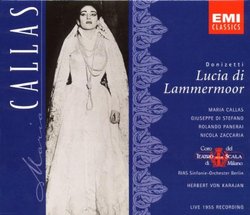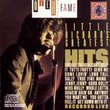| All Artists: Maria Callas, Giuseppe di Stefano, Nicoal Zaccaria, Rolando Panerai, Coro del Teatro alla Scala Title: Donizetti: Lucia di Lammermoor / Callas, di Stefano, Panerai, Zaccaria; Karajan Members Wishing: 0 Total Copies: 0 Label: EMI Classics France Release Date: 3/17/1998 Album Type: Original recording remastered, Import Genre: Classical Styles: Opera & Classical Vocal, Historical Periods, Modern, 20th, & 21st Century Number of Discs: 2 SwapaCD Credits: 2 UPCs: 724356644120, 724356644151 |
Search - Maria Callas, Giuseppe di Stefano, Nicoal Zaccaria :: Donizetti: Lucia di Lammermoor / Callas, di Stefano, Panerai, Zaccaria; Karajan
 | Maria Callas, Giuseppe di Stefano, Nicoal Zaccaria Donizetti: Lucia di Lammermoor / Callas, di Stefano, Panerai, Zaccaria; Karajan Genre: Classical
Lucia was another one of Callas's signature roles; in fact, one might argue that she made people listen to it in a manner they had neglected since its inception. Long the territory of canary-like high sopranos with no in... more » |
Larger Image |
CD DetailsSynopsis
Amazon.com essential recording Lucia was another one of Callas's signature roles; in fact, one might argue that she made people listen to it in a manner they had neglected since its inception. Long the territory of canary-like high sopranos with no interest in drama (e.g., Lily Pons), Callas brought the role into the same dramatic focus it had been created for. At its premiere in 1835, members of the audience wept audibly at Lucia's lunacy. With her darker tone and psychological probing, Callas made us hear what was in the poor girl's soul--she was an innocent, tricked, abandoned, and driven mad. This live performance, in so-so sound (but absolutely worth it), is staggering in its musical and dramatic potency; something between Callas and Karajan was in the air that made them think, breathe, and create music as one. Callas ducks the first big E-flat in the Mad Scene for dramatic effect; the second one is all the more special for making us wait for it. And elsewhere Callas's "rightness" within the role is never in doubt. Costar Giuseppe di Stefano, too, is at his best, singing with ardor and gorgeous streams of sound, and the ensemble work is so spectacular that the audience demands--and gets--an encore of the 2nd Act sextet. Any collection of great opera recordings without this set is incomplete. --Robert Levine Similarly Requested CDs
|
CD ReviewsMagnificent Performance Vincent Lau | 02/05/2000 (5 out of 5 stars) "This recording is not only a document of immense historical interest, it also preserves in sound what is by all standards a magnificent performance of Donizetti's opera. At the centre of the stage is, of course, Maria Callas. Her portrayal of Lucia in the Berlin performance captured here is a trifle more pallid than that in her first EMI studio recording. Some of the vocal accentuations are also less strongly etched than previously, although there continues to be lots of interesting details in her interpretation of the part. There is, by contrast, an increased tenderness in both characterisation and vocal utterance which highlights the vulnerability and helplessness of the heroine, and thereby making the final tragedy even more shocking and poignant. The "Mad Scene" is hauntingly introspective and it is thus entirely appropriate that Callas doesn't opt for an E flat in alt at the end of "Ardon gli incensi", which otherwise would have been musically and dramatically inconsistent with the interpretation of the scene. Nevertheless, Callas is generally in very good voice and her coloratura singing in the extended cadenza in the "Mad Scene" is, barring just one unsteady B flat, impressively executed. On the whole, she has given us a mesmerising portrayal of Lucia with many vocal delights along the way.Opposite Callas, Giuseppe di Stefano gives what must be one of his best performances as Edgardo. Not only is he in marvellous vocal form, his singing is involving and red-blooded, making him the perfect romantic hero of great ardour. He is here also more subtle and stylish than usual, caressing his lines and even individual words in the act one duet. He performs the final scene with great sensitivity and succeeds in making this scene, which can be an anti-climax in some performances, a most tragically moving one. The other cast members are also excellent. Rolando Panerai sings lustily as Enrico and, through his vocal acting, one can almost see how he put pressure onto her poor sister. Nicola Zaccaria is a warm and sympathetic Raimondo while Giuseppe Zampieri and Luisa Villa are respectively an aristocratic Arturo and an attentive Alisa. The La Scala Chorus, despite some ragged ensemble in places, sings with feeling and panache.And there's Herbert von Karajan. Some people may wonder whether a Karajan is necessary for this opera, which is basically a vehicle for star singers. However, under the sure hands of Karajan, the orchestral playing is not only secure, it is also impressively sculpted with lots of light and shade (and some Beethovenian accents in Act II), which makes one appreciate the score afresh. It is evident that there exists a wonderful rapport between the stage and the pit and everything coalesce into a complete, consistent and organic whole, which never fails to move and thrill the listener.As the recorded sound is above average for a stage performance in the mid-50s, this set has provided me with immense pleasure. Not only would I put it above both the studio versions of the opera with Callas, it is, to me, the ultimate LUCIA which no one should afford to miss." Bel canto restored Vincent Lau | 10/20/1999 (5 out of 5 stars) "Bel canto is not only about high notes and fireworks (as some listeners and singers in the mould of, for example, Edita Gruberova, would think, it is one of the most expressive music ever written. Callas was the first to REALLY understand that, and she marvellously restored a great 19th century tradition of using heavier voices in this kind of opera. The type of soprano is called drammatico con agilita which is able to convey emotion and sing the musical line in a sort of "lunar" way that Rost, Svenson, Gruberova etc. cannot even hint at. Sutherland and Scotto came close to this ideal at least as far as Lucia is concerned, but they just couldn't surpass Callas. Nowadays, voices of this calibre have gone and both theatres and recording companies have to make do with thin voices (I am tempted to say "canaries")which are all right to produce E-flats and other virtuosities (if this is what you look for in bel canto), but they are literally crippled when it comes to musical drama and phrasing. Callas' Berlin performance is legendary, to my mind superior to both Callas studio recordings and an example to follow in portraying the haunted Lucy and creating the right atmosphere from the very beginning (listen to her Regnava nel silenzio...). The crowning glory is, of course, the mad scene, so distant and yet true and close, and I couldn't care less about the famous "missing" E-flat (so often underlined by those with arena mentality), if you want to have one, and a good one, just wait until the end of the scene.I am thrilled to see that Callas continues to arouse sometimes violent controversy among opera fans, since controversy is her main feature. She continues to outsell all living sopranos. She swept aside a number of bad habits (alas they are being re-introduced)and showed the direction to embark in so many operas. Even now every respectable singer trembles when taking on a "Callas role", such was her impact. Tosca, Norma, Lucia and Traviata - her most famous roles - are champ de battaille of Callas fans and detractors also at Amazon: most probably you would have a one or five stars rating, because you adore her or you don't like her at all. She continues to "upset" people. Can anything of the above be said of any other soprano and all that 34 years after her final curtain and 22 years after her death?" Great lucia ruth | Germany | 01/24/2004 (5 out of 5 stars) "Callas and Sutherland are the best Lucias.Basta!!!
Callas singing off tune????That's really ridiculous.Everyone who is claiming such a nonsense is absolutely deaf. This legendary live-recording is fantastic,if you prefer a better sound-quality buy Callas' Lucia-recording of 1953 (with Serafin,Di Stefano and Gobbi).I think that this studio-recording is Callas'most convincing portrayal of Lucia di Lammermoor." |

 Track Listings (14) - Disc #1
Track Listings (14) - Disc #1


